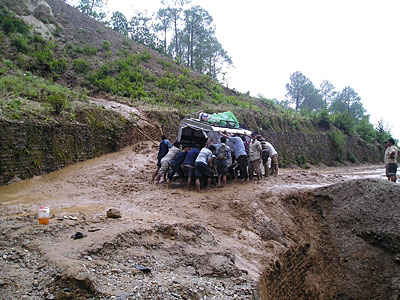 BIBHAV ACHARYA STUCK IN THE MUD: Passengers try to push their jeep out of a landslide on the only road that connects Achham to the rest of Nepal. |
Of all the factors that keep the people of Achham and other districts in far-western Nepal deprived, perhaps the most important is poor transportation. Roads, where they exist, are rough, narrow and dangerous.
Lack of bridges and frequent landslides make getting from here to there even harder, slowing down essential supplies like food and medicines, and making it difficult to get the sick to hospital.
Western Nepalis are often described as being "resource-poor". While not incorrect, this phrase is misleading in districts like Achham. For example, landslides and their consequences are usually portrayed as unfortunate "natural" disasters. Actually they are largely man-made because the agencies that could have helped prevent them and rushed relief after they occur are portrayed as unable to deal with such an overwhelming "act of god".
Inaction is thus excused and the lack of response becomes the norm. The rugged topography of western Nepal makes roads difficult to build and maintain, but much of the inaccessibility is caused by poor design, corruption, and the lack of a maintenance ethic. When a landslide does occur, waiting several days for the debris to be cleared is a given and people have never expected emergency services to be immediately pressed into action.
When roads are blocked, the prices of commodities shoot up. Transportation costs are high even in the best of times because of cartelling by bus and truck syndicates. Estimates put fares at up to 55 per cent higher than what they should be. This is not because the far-west is "far", but because the poor in the region are the victims of anti-competition price-fixing. Cartelling is commonplace all over the country, but it is especially damaging in the far-west where people just cannot afford the markup in prices of food and medications.
When we think of a region as "resource-poor", suffering is presented as a default state and no one is asked to take responsibility for causing it. This bolsters the fatalistic belief that people suffer because they happen to live in a "resource-poor" part of the country. Actually, resource deprivation is a consequence of the denial of resources.
In a well-functioning democracy, the residents of far-western Nepal would be able to hold their governing bodies accountable for the inequitable distribution of resources. In Nepal, the accepted form of protest is to block roads but for the people of Achham this is not an option because the paved road ends in the district.
The first thing we can do is recognise that although resources are scarce, we should stop calling western Nepal "resource-poor". This distorts the reality, and lets those who are responsible for preserving the status quo get away with it.
Let us put pressure on those with resources to improve road conditions, respond to landslides and loosen their grip on the poor by opening up transportation options in this remote, impoverished and resource-denied region.
Bibhav Acharya is with Nyaya Health, which operates the Bayalpata Hospital in Achham in collaboration with the Ministry of Health and Population.
READ ALSO:
Missionary zeal, MICHAEL COX



